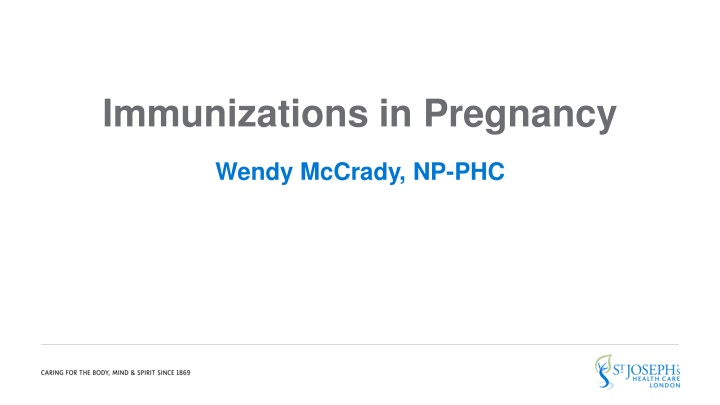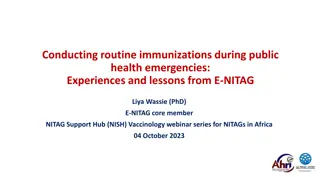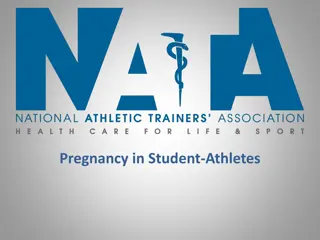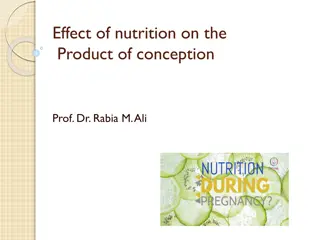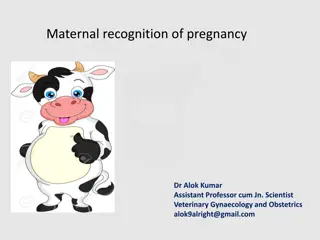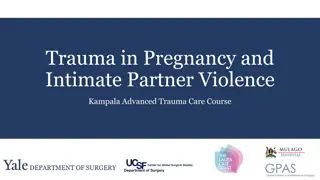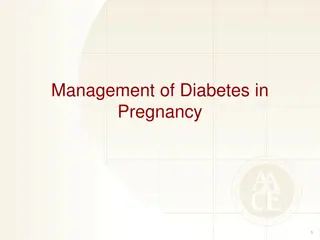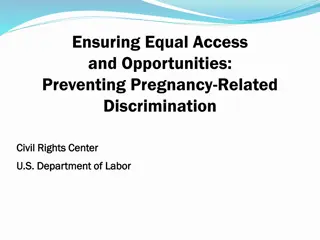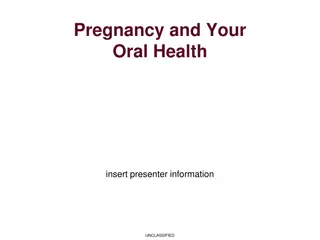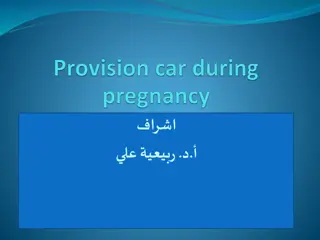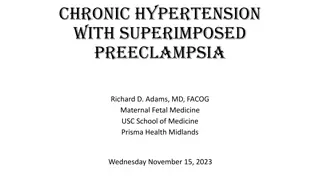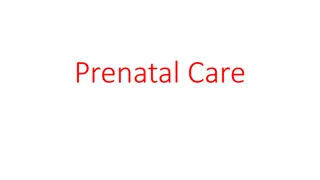Benefits of Immunizations in Pregnancy: Ensuring Protection for Mother and Baby
Explore the advantages of immunizations during pregnancy, including safeguarding the pregnant woman, providing passive immunity to the fetus, and protecting the neonate. Learn about the risks, contraindications, and how to approach controversies in immunization guidelines. Delve into the crucial considerations regarding vaccine safety, effectiveness, and the impact on maternal and infant protection.
Download Presentation

Please find below an Image/Link to download the presentation.
The content on the website is provided AS IS for your information and personal use only. It may not be sold, licensed, or shared on other websites without obtaining consent from the author.If you encounter any issues during the download, it is possible that the publisher has removed the file from their server.
You are allowed to download the files provided on this website for personal or commercial use, subject to the condition that they are used lawfully. All files are the property of their respective owners.
The content on the website is provided AS IS for your information and personal use only. It may not be sold, licensed, or shared on other websites without obtaining consent from the author.
E N D
Presentation Transcript
Immunizations in Pregnancy Wendy McCrady, NP-PHC
Faculty/Presenter Disclosure Presenter: Wendy McCrady, NP Relationships with commercial interests: Grants/Research Support: N/A Speakers Bureau/Honoraria: N/A Consulting Fees: N/A Other: N/A
Disclosure of Commercial Support This program has received no commercial financial support. This program has received no in-kind support.
Mitigating Potential Bias Not applicable.
Objectives 1. Review the benefits of immunizations in pregnancy. 2. Review risks and contraindications of immunizations in pregnancy. 3. Discuss controversies/inconsistencies in guidelines and how these might be approached.
Benefits of Immunizations in Pregnancy Protection of pregnant woman: altered immune response so are at increased risk for some infections and at increased risk of severe outcomes if infected (NACI) Protection of fetus: passive immunity - protective concentrations of maternal antibodies may be transferred to the fetus transplacentally, majority occurring during 3rdtrimester (NACI) Neonate and young infant - protection from infections that could result in severe illness (NACI) - passive immunity through colostrum/breast feeding - prevents mother from acquiring infection that may be passed on to newborn baby (encourage family members to update vaccines - cocooning)
General Considerations Are vaccines safe for pregnant woman and their fetus if given during pregnancy? Do vaccines provide effective protection to pregnant women if given during pregnancy? Does vaccinating mothers increase the protection of infants? Does maternal antibody transferred across the placenta interfere with neonatal immune response to immunization?
Do vaccines provide effective protection to pregnant women if given during pregnancy? Pregnant women respond adequately to vaccines even though pregnancy is an immunologically altered state (NACI, SOGC, CDC)
Does maternal antibody transferred across the placenta interfere with neonatal immune response to immunization? Maternal antibodies typically have a half-life of 3 to 4 weeks in the newborn, and progressively decrease during the first 6 to 12 months of life. Recommended infant immunization schedules take into consideration the potential effect that maternally transferred antibodies may have on infant vaccinations Example: Live vaccines scheduled for children >12 mo old and not counted if given prior (NACI)
Safety of Inactivated Vaccines in Pregnancy No published data indicating that currently authorized inactivated vaccines are teratogenic, embryotoxic, or have resulted in specific adverse pregnancy outcomes. (NACI) Inactivated viral vaccines, bacterial vaccines, and toxoids are considered safe in pregnancy. (SOGC II-1, NACI, CDC) Reactions following vaccination with inactivated vaccines are usually limited to the injection site. (NACI) No increase in anaphylactic reactions or events that might induce preterm labour has been observed. (NACI) There is no safety reason to avoid the use of thimerosal-containing vaccines (EngerixB, Fluviral, Fluzone, Vaxigrip) for pregnant women. (NACI)
Risks and Contraindications of Immunizations in Pregnancy Live and live-attenuated vaccines contraindicated: MMR, VZ, HZ, Yellow Fever, oral Typhoid, (Small Pox-special access), (Flumist, Rotavirus) Non-pregnant women immunized with live/live-attenuated vaccine should be counselled to delay pregnancy for at least 4 wks. (SOGC III) Contraindication due to a theoretical risk to the fetus. (SOGC II-3) No evidence of CRS in any of the offspring of the 226 women inadvertently vaccinated with MMR during pregnancy (NACI) Women who have inadvertently received immunization with live or live- attenuated vaccines during pregnancy should not be counselled to terminate the pregnancy because of a teratogenic risk. (SOGC II-2)
Exceptions to contraindications As always, assess Risk: Benefit Harm of contracting wild disease >> harm from immunization In some situations, potential benefits of vaccination with MMR vaccine may outweigh risks such as during measles or rubella outbreaks, in which case vaccination may be considered based on recommendations from public health officials (NACI) Yellow fever vaccine may be considered in a pregnant woman travelling to an endemic area (NACI)
Immunizations while Breastfeeding Women who are breastfeeding can still be immunized (passive-active immunization, live or killed vaccines) (SOGC II-1) Immunizations for actively breastfeeding women are considered safe, with the exception of smallpox vaccine (theoretical risk for contact transmission) and yellow fever (reports of probable transmission through breastfeeding) (RxFiles, NACI) Breastfeeding does not appear to influence the maternal immune response (RxFiles) With above exception vaccines do not appear to affect the safety of breast milk for infants (RxFiles) Not known whether BCG vaccine is excreted in human milk (NACI)
Specific Vaccines Influenza All pregnant women, at any stage of pregnancy, should be considered high priority for receiving inactivated influenza vaccine due to (NACI): increased risk of influenza-associated morbidity evidence of adverse neonatal outcomes associated with maternal influenza evidence that vaccination of pregnant women protects their newborns from influenza and influenza-related hospitalization evidence that infants born during influenza season to vaccinated women are less likely to be premature, small for gestational age, and low birth wt Women who did not receive influenza vaccination during pregnancy should receive influenza vaccine post-partum before discharge from hospital if it is influenza season (NACI)
Safety of Influenza Vaccine in Pregnancy There is good evidence demonstrating the safety of inactivated influenza vaccine during pregnancy. Live attenuated flu vaccine (Flumist) should not be given to pregnant women Most flu vaccines contain thimerosal safe in pregnacy (not in Agriflu) Active surveillance following influenza vaccination during pregnancy has not shown evidence of associated harm to the mother or fetus Passive surveillance has not raised any safety concerns, despite widespread use of influenza vaccine in pregnancy over several decades - both adjuvanted and unadjuvanted pH1N1 vaccine in more than 100,000 pregnant women in Canada and almost 500,000 pregnant women in Europe did not reveal any safety concerns. (NACI)
Specific Vaccines: Tdap -Tetanus, diptheria, acellular pertussis (Adacel, Boostrix) Given for Pertussis component (n/a on its own) Increase in number cases of pertussis in Canada in 2012 (NACI) (3x number of cases compared to from 2005-2011) Greatest morbidity/mortality occurs in children < 6 mo of age (NACI) All adults: Substitute 1 time adult dose of Tdap for Td booster (most women of childbering age), then boost with Td q10yr (NACI) Safety of Pertussis vaccine in early pregnancy not established Generally takes 2-3 weeks post immunization to achieve immunity Give to mother >20 weeks pregnancy, ideally at 27-36 weeks pregnancy per SOGC, >26 weeks per NACI
Pertussis Vaccine - continued To maximize the passive antibody transfer to the infant, administer Tdap during the early part of gestational weeks 27 through 36. Postpartum Tdap Administration Is NOT Optimal (Centers for Disease Control and Prevention) Compared to postpartum vaccination, vaccination in pregnancy could potentially reduce annual infant pertussis incidence by 33% versus 20%, hospitalizations by 38% versus 19%, and deaths by 49% versus 16% (NACI)
Pertussis If anticipating regular contact with infant 12mos (e.g. parents, grandparents, adolescents), consider Tdap regardless of interval since last tetanus/diphtheria vaccine (ACIP in RxFiles, NACI) Ideally administered at least 2 weeks before contact with the infant. (NACI) Persons who have had pertussis infection should receive pertussis-containing vaccines as recommended because infection does not confer long term immunity (NACI)
Specific Vaccines Hepatitis B Hep B immunization: no increased risk to mother in pregnancy or to fetus/infant, no contraindication when pregnant (NACI) Standard of care to check for HBsAg in pregnancy Acute HB in a pregnant woman may result in severe disease for the mother and chronic infection in the infant A pregnant woman who has no markers of HB infection but who is at high risk of HB should be offered a complete HB vaccine series at the first opportunity during the pregnancy and should be tested for antibody response.
Specific Vaccines Hepatitis B Per Ontarion Perinatal Record: Newborn needs Hep B prophylaxis refers to the needs of the newborn in a household where Hepatitis B exposure is possible. Infants born to a mothers who are HBsAg positive require passive immunization with HepB immunoglobulin (HBIG) and the 1stof 3 doses of active immunization with Hepatitis B vaccine at birth - and HepB vaccine at 1 & 6 mo In households where close family members other than the mother are HBsAg positive, the newborn needs active immunization only.
Other Vaccines recommended for the protection of a pregnant woman's health (NACI) No theoretical reason to suspect adverse events: Hepatitis A vaccine consider for a woman who is a close contact of a person with hepatitis A or who is travelling to an endemic area Tetanus toxoid and reduced diphtheria toxoid-containing vaccine if indicated Meningococcal vaccine consider in an outbreak or post-exposure Pneumococcal polysaccharide (Pneumovax) or conjugate vaccine (Prevnar) consider for women in a high risk group due to underlying illnesses
Vaccines not generally recommended (NACI) Rabies: Avoidance of risk should be considered and pre-exposure immunization delayed unless substantial risk of exposure remains -If a pregnant woman has had a potential exposure to rabies, post- exposure prophylaxis should be given (Ig + vaccine) Cholera and travellers' diarrhea vaccine, and Japanese encephalitis vaccine have not been studied in pregnant women. Administration of either vaccine to pregnant women may be considered only in high risk situations after evaluation of the benefits and risks. Inactivated parenteral typhoid vaccine (+ HA is Vivaxim) should be used in high risk situations if protection against typhoid is required (oral (Vivotif) is live attenuated - avoid)
Vaccines not Recommended (NACI) HPV data on efficacy and safety of vaccination in pregnancy are limited. -No adverse outcomes of pregnancy or adverse events to the developing fetus have been reported. -Initiation should be delayed until after completion of pregnancy. -If a woman is found to be pregnant after initiating the vaccination series, completion of the series should be delayed until after pregnancy. -No intervention is required if vaccine has been administered during pregnancy
Vaccines to Avoid MMR - Measels, Mumps, Rubella (MMR II, Priorix, MMRV) Live attenuated do not give if known pregnancy Immunity desirable prior to pregnancy delay pregnancy until 4 weeks after immunization Risk of disease during pregnancy: congenital rubella syndrome (miscarriage, stillbirth or fetal malformations, including congenital heart disease, cataracts, deafness and mental retardation) Highest risk of CRS in 1sttrimester, progressive decrease in risk thereafter, very uncommon after 20 weeks gestation OB standard of care to check immunity early in pregnancy and given post partum if not immune Check immunity 6 weeks pp if given with RhIg
Vaccines to Avoid Varicella Vaccine (Varivax, Varilrix, MMRV) Live attenuated - contraindicated in pregnancy due to theoretical risk to the fetus but lack of evidence to demonstrate teratogenic or other risk Delay conception for 4 weeks after immunization Inadvertent immunization during pregnancy not a reason to terminate. Screen for varicella antibodies if no history of disease or 2 doses of varicella vaccine. If susceptible give immediate post-partum period, before discharge from hospital, 2nddose in 6 weeks (NACI) Consider implications if RhIg also needed
Vaccines to Avoid Varicella Vaccine (Varivax, Varilrix, MMRV) Post-exposure prophylaxis with VZIg for susceptible pregnant women exposed to varicella (NACI) Varicella disease may be complicated by pneumonia in up to 28% of pregnant women - remains associated with risk of mortality - 16/198 varicella cases (SOGC) Disease in early pregnancy associated with 1% risk of congenital infection (cerebral cortical atrophy, mental retardation, dermatomal specific limb abnormalities) (SOGC) Maternal disease 5d prior-2d after delivery associated with severe neonatal varicella in 17-30% infants and case fatality rate as high as 31% (SOGC)
Controversies/Inconsistencies: Rubella Ontario Perinatal Record Users Guide: Record Rubella status as immune (positive titre) or nonimmune (negative or indeterminate). Check box in Recommended Immunoprophylaxis on the OPR 3 if rubella immunization is required postpartum. Inform patient/client of non-immune status.
Controversies/Inconsistencies - Rubella SOGC: MMR given postpartum if not immune to rubella prenatally Prior immunization history not on OPR. Users guide: Offer postpartum vaccination with MMR if not immune or rubella indeterminate NACI: Serologic testing not routinely recommended before/after receiving rubella-containing vaccine. Pregnant women without documented evidence of prior immunization should be serologically screened for rubella antibodies. Those found to be susceptible should be vaccinated with 1 dose of MMR vaccine in the immediate post-partum period, before discharge from hospital. Women appropriately immunized post-partum do not need to be serologically screened post-immunization (unless RhIg) or in subsequent pregnancies. Women who have been found to be serologically positive in one pregnancy do not need to be screened again in subsequent pregnancies.
Controversies/Inconsistencies - Rubella Possible reasons for recommended repeat vaccination Rubella dsease: transient erythematous rash, post-auricular and suboccipital lymphadenopathy, arthralgia and low-grade fever. As symptoms are non-specific, it may be mistaken for infection due to other viruses and up to 50% of infections are subclinical (NACI) Transplacental transmission from an infected mother to her fetus during pregnancy may result in Congenital Rubella Syndrome Infected infants who appear normal at birth may later show eye, ear or brain damage. Congenital infection may give rise to such problems as diabetes mellitus and panencephalitis later in life (NACI) However: Over 97% of individuals develop immunity after 1 dose of rubella vaccine (NACI)
Controversies/Inconsistencies Tdap/Pertussis Ontario Perinatal Record user s guide: offer or refer for a booster of Tdap in the third trimester if they have not received a dose of acellular pertussis vaccine in adulthood. The approach may differ when there is a pertussis outbreak The American College of Obstetricians and Gynecologists opinion on Tdap in pregnancy, Sept 2017: Give Tdap @ 27-36 weeks with each pregnancy (CDC & ACIP recommended in 2012) UK's Department of Health introduced a temporary immunization programme for all pregnant between 28-38 weeks of gestation during an outbreak in 2012
Controversies/Inconsistencies Tdap/Pertussis CDC: The level of pertussis antibodies decreases over time, so you should administer Tdap during every pregnancy in order to transfer the greatest number of protective antibodies to each infant NACI: Protection does not significantly decline between the first booster (18 months) and second booster (4-6 years) with an acellular pertussis vaccine. However, a progressive decline in protection has been observed following the second booster dose. NACI will be assessing the implications of this finding. -Although pregnancy is considered to be an immunomodulatory condition, conducted serological studies indicate the immune response following vaccination with Tdap is comparable between pregnant & non-pregnant women -Immunologic correlates of protection against pertussis are not well-defined, but higher levels of anti-pertussis antibodies seem to be associated with greater protection.
NACI Update on Pertussis Vaccination in Pregnancy Feb 2014: NACI does not recommend a universal program for vaccination of pregnant women given the current epidemiology in Canada
References ACIP- Advisory Committee on Immunization Practices (American) in Rx Files Center for Disease Control and Prevention National Advisory Committee on Immunizations (NACI), Canadian immunization Guide https://www.canada.ca/en/public-health/services/canadian-immunization-guide.html RxFiles online http://www.rxfiles.ca/, Vaccines: Adult, March 2017 SOGC Clinical Practice Guideline: Immunization in Pregnancy, J Obstet Gynaecol Can 2008;30(12):1149 1154
Wendy McCrady, MScN NP-PHC St. Joseph s Family Medical Centre, Western University Lecturer and Coordinator MN-PHCNP programs wmccrady@uwo.ca
